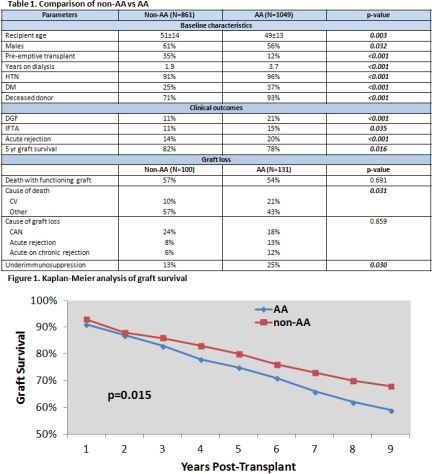Divergence in Risk Factors for Graft Loss and Death Across Race May Mediate Kidney Transplant Outcome Disparity
1Department of Medicine, Medical University of South Carolina, Charleston, SC
2Department of Surgery, Medical University of South Carolina, Charleston, SC.
Meeting: 2015 American Transplant Congress
Abstract number: D51
Keywords: Graft survival, Kidney transplantation
Session Information
Session Name: Poster Session D: Disparities in Healthcare Outcomes
Session Type: Poster Session
Date: Tuesday, May 5, 2015
Session Time: 5:30pm-6:30pm
 Presentation Time: 5:30pm-6:30pm
Presentation Time: 5:30pm-6:30pm
Location: Exhibit Hall E
Differences in outcomes between African American and non-African American kidney transplant recipients may reflect disparate access to health care. Minimizing this disparity demands a deeper understanding of the causes of graft loss and death. Therefore, the aim of this study was to assess the predominant causes of graft loss in kidney transplantation (KTX) and compare these based on recipient race.
Methods: We reviewed KTX recipients between 1999-2012 with a detailed review of the medical records to determine true causes of graft loss. Baseline characteristics and reasons for graft loss were compared across race (AA vs non- non-AA), using univariate and multivariate methods.
Results: 1,910 kidney transplant recipients were included in this analysis: 1,049 AA and 861 non-AA. Pre-emptive transplant and living donors were less frequent among AAs; pre-transplant dialysis time was shorter among non-AAs. Diabetes and HTN were more prevalent among AAs. Delayed graft function, acute rejection, and interstitial fibrosis/tubular atrophy were more prevalent among AAs, along with significantly lower 5-year graft survival (Fig. 1). Among those with graft loss, AAs died more frequently of cardiovascular causes. Furthermore, AAs lost grafts more frequently in association with under-immunosuppression (Table 1).

Conclusion: The greater prevalence of death with a functioning graft associated with cardiovascular disease among AA likely reflects poor access to health care or a higher cardiovascular risk factor burden. Decreased intensity of immunosuppression translates into acute rejection-associated graft loss among AAs. Our results suggest that reducing racial disparities in transplant outcomes demands increased health care access, specific attention to cardiovascular disease, and due consideration of intensity of immunosuppression.
To cite this abstract in AMA style:
Salas MPosadas, Taber D, Kamel M, Kadian M, Salazar M, Mohan P, Srinivas T. Divergence in Risk Factors for Graft Loss and Death Across Race May Mediate Kidney Transplant Outcome Disparity [abstract]. Am J Transplant. 2015; 15 (suppl 3). https://atcmeetingabstracts.com/abstract/divergence-in-risk-factors-for-graft-loss-and-death-across-race-may-mediate-kidney-transplant-outcome-disparity/. Accessed July 5, 2025.« Back to 2015 American Transplant Congress
